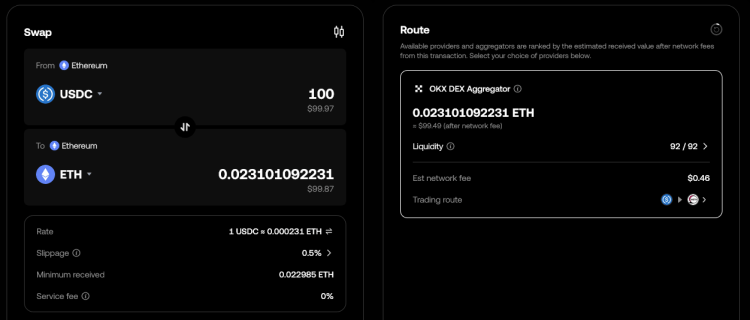In this guide, we analyze the best decentralized exchanges (DEXs) to find the best one for you. Privacy, anonymity, and liquidity (trading volume) are a must when trading on DEXs, and our recommendations will reflect that.
Trading on DEXs typically involves lower liquidity, higher slippage (difference in anticipated and actual price), and slower trades. But you get data protection, transparency, and self-custody of funds in exchange.
Many prefer DEXs to centralized exchanges for the lower barrier to entry and peace of mind, though they often list new tokens straight out of presale, which can carry higher risks.
The best DEX platform we found is Best Wallet, with MEXC DEX+ also ranking near the top. Let’s break down the standout features and see which one fits your trading style.
At a Glance – The Top DEXs To Consider
Before we go into more detail on the best decentralized exchanges for crypto, here’s an overview of our recommendations.
| Best Wallet | Non-custodial wallet with integrated DEX aggregation and multi-chain swap support |
| MEXC DEX+ | DEX aggregator with deep liquidity access and simplified on-chain trading |
| OKX | Multi-chain DEX aggregator with smart routing and competitive swap execution |
| The True Trade | Decentralized trading platform focused on fast swaps and streamlined execution |
| Changelly | Instant crypto exchange with wide asset coverage and easy token swaps |
Decentralized Exchanges Explained
A decentralized exchange (DEX) is a peer-to-peer (P2P) marketplace that lets you trade crypto directly with others, with no middleman involved (like in the case of CEXs).
DEXs have several pros and cons and differ from centralized exchanges (CEXs) in several ways. Let’s explore these differences below.
What Are The Benefits of Using a DEX?
You might prefer DEXs for several reasons:
- Asset self-custody: You hold the private keys to your assets (instead of a third party), reducing the risk of hacks and asset theft.
- Market manipulation prevention: Help protect you against fake trading, wash trading, and other manipulation tactics, ensuring fair trading.
- High hacking resistance: Their decentralized nature means the network continues to function even if a computer in the DEX is hacked, so your funds remain safe.
- Greater privacy and anonymity: Most DEXs don’t ask for a KYC, appealing to those who value discretion.
- Lower fees: No middlemen mean lower exchange fees, so you’re mostly paying for transaction/gas fees, benefiting those who tend to make large, infrequent trades.
- Access to more tokens: DEXs tend to list new tokens, making them the perfect place for coinsnipers and thrill seekers (still, DYOR before investing, as volatility is very high for new tokens).
- Permissionless trading: No one approves or rejects your transactions on a DEX exchange. There are no frozen accounts or transactions, either.
- Financial inclusion: Anyone can trade on DEXs, no matter their location, as there are no geographical restrictions.
Overall, there’s a very strong argument to be made about using a DEX crypto exchange. It’s no wonder the total daily DEX trading volume is over $12B.
What Are The Disadvantages of Using a DEX?
However, DEXs aren’t the golden goose of crypto trading. Here are the main cons you should know about:
- Lower liquidity: DEXs tend to have lower liquidity, which leads to higher price volatility and slippage. This can potentially cut into your profits due to delayed and unprofitable trades.
- Less user-friendly: DEXs often lack customer support and introduce new concepts like slippage control, which may confuse less experienced traders.
- Slower transaction speed: As DEXs process transactions on-chain, they tend to be slower than the automated matching engines used by CEXs like Binance and Kraken.
- Higher risk of scam projects: The newer tokens on DEXs increase the risk of encountering scams or pump-and-dump schemes.
While DEXs are not without their flaws, the benefits typically outweigh the cons. But to offer a comprehensive review, let’s discuss the differences between DEXs and CEXs.
Click here to discover the differences between CEXs and DEXs
- CEXs have more liquidity, leading to less slippage and faster trades.
- CEXs generally list less volatile coins and those with lower risks of being scam projects.
- DEXs are more private, as there’s no centralized entity collecting data on you.
- With self-custodial DEXs, you are wholly responsible for the security of your private keys and, hence, funds.
- CEXs are typically more likely to impose geographical restrictions to comply with regulations than DEXs.
- CEXs’ centralized model means users are more vulnerable to hacks than on DEXs.
- CEXs tend to be cheaper for smaller, frequent trades, while DEXs are more affordable for large, infrequent trades.
Choosing between a CEX and a DEX ultimately depends on your use case and needs. Do you value privacy, anonymity, and portfolio diversity more than liquidity, accessibility, and fewer scam risks? If so, DEXs are the answer.
But if you want faster trades, a beginner-friendly experience, and a simpler trading process, then CEXs are the better option.
Expert Analysis – Best Decentralized Crypto Exchanges
In our search for the best decentralized trading platform, we narrowed down the list to six DEXs. Let’s see what makes them tick and which you should choose for your use case.
1. Best Wallet – Non-Custodial Wallet with Built-In DEX Aggregation
Best Wallet is the strongest DEX-focused option on our list because it combines a non-custodial wallet with an integrated swap engine. Instead of forcing you to jump between multiple apps, Best Wallet lets you store assets, connect to dApps, and swap tokens across supported networks directly inside one interface.
The main benefit is simplicity: Best Wallet’s swap feature scans available liquidity routes to help users get better execution without manually comparing DEXs. You can also adjust settings like slippage tolerance, which is critical when trading meme coins or fast-moving tokens where price impact can be brutal.
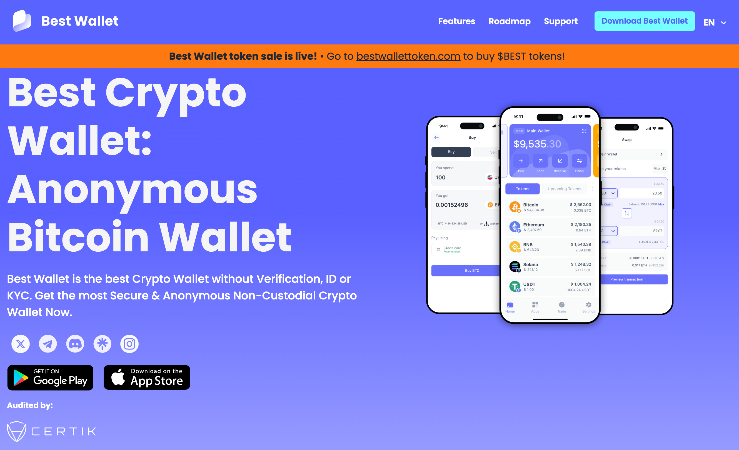 Since it’s non-custodial, there’s no account approval process, no mandatory KYC, and no platform that can freeze your funds. You just create a wallet, secure your recovery phrase, and you’re ready to trade. This model is closer to the original spirit of DeFi, but it also means you’re responsible for your own security.
Since it’s non-custodial, there’s no account approval process, no mandatory KYC, and no platform that can freeze your funds. You just create a wallet, secure your recovery phrase, and you’re ready to trade. This model is closer to the original spirit of DeFi, but it also means you’re responsible for your own security.
Best Wallet is best suited for traders who want DEX access without the typical friction: complicated interfaces, constant wallet switching, and unnecessary steps.
2. MEXC – DEX Aggregator & P2P Marketplace with Custodial Key Management
While MEXC is primarily a CEX, MEXC’s DEX+ is a multi-chain aggregator that scans multiple major platforms like Raydium and Pump.fun to find the best route. You can adjust slippage tolerance, which is useful for volatile tokens where higher slippage can ensure your order goes through even if the price starts pumping.
In MEXC’s hybrid model, the platform manages your private keys, but your DEX+ transactions are still settled on the blockchain. Due to added convenience, MEXC DEX+ also charges more than other platforms on our list – 1% per swap.
MEXC DEX+ also protects its users against honeypots – malicious tokens that allow purchases but then can’t be sold. The platform analyzes contract addresses, security audits, and token holder distribution to filter out potential honeypots and clone projects.
 Apart from DEX+, MEXC has a CEX with P2P (peer-to-peer) marketplace, which might be preferable for newcomers into crypto.
Apart from DEX+, MEXC has a CEX with P2P (peer-to-peer) marketplace, which might be preferable for newcomers into crypto.
DEXs require you to manage your private keys and have some crypto to begin with, as they only support crypto-to-crypto swaps. A CEX with P2P features like MEXC lets you buy crypto with fiat and restore access to your account with just your email.
Besides, DEX users more commonly face risks like rug pulls and honeypots, despite security algorithms that aim to filter them out. CEXs only list vetted tokens, so it’s a much safer option overall.
Still, as a service provider, MEXC bears some responsibility: it holds funds in escrow until your transaction is completed.
Of course, this approach has some distinctions from DEXs. Your orders settle in MEXC’s internal system, not directly on the blockchain, and MEXC holds your assets in custody. While this simplifies account management, it also means the platform can freeze your account or reverse transactions.
In the future, holders of MEXC’s native $MX token will receive special perks across the entire ecosystem, including the DEX and P2P marketplace.
3. OKX – Multi-Chain Aggregator with Smart Money Tracking & Zero Fees on Major Tokens
OKX is one of the largest CEXs in the world, but not everyone knows it also has a DEX, accessible through the OKX Wallet’s website or app. Although the DEX aggregator is presented as a feature of the OKX Wallet, you can also use it with other crypto wallets, such as Best Wallet or Metamask.
The aggregator connects to over 500 DEXs and 130+ blockchains, automatically finding the best pathway for your swaps (including cross-chain swaps). It compares prices from numerous liquidity providers and factors in slippage and gas fees for optimal cost.
Perhaps the best thing about OKX’s DEX aggregator is ease of use – even beginners will quickly find their way around it in the Easy mode.
For experienced traders, OKX offers Advanced mode with custom gas fee settings, candlestick charts, and routing details. This mode even lets you place limit and stop-loss orders, a feature rarely available on DEXs, and automate recurring buys at predetermined intervals (Dollar-Cost Averaging strategy).
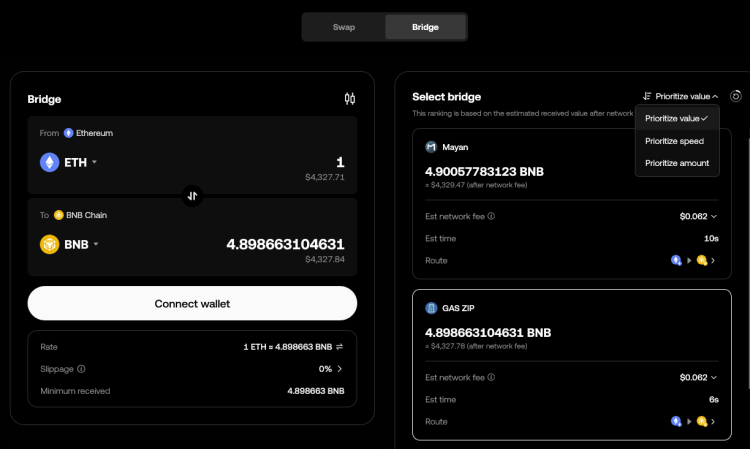 Cross-chain swaps are accessible through the Bridge tab, where you’ll find several available routes with estimated network fees, swap times, and processors. You can sort them by best value, speed, or the final amount you get.
Cross-chain swaps are accessible through the Bridge tab, where you’ll find several available routes with estimated network fees, swap times, and processors. You can sort them by best value, speed, or the final amount you get.
On the security front, OKX implements MEV (Maximal Extractable Value) attack protection. In MEV attacks, bots exploit pending transactions, placing competing orders so that traders end up paying more than they initially planned.
OKX’s private mempool (where all pending transactions are typically visible) keeps details hidden from the public until transaction execution.
Unlike many DEXs that charge a fixed fee per swap, OKX has tiered fee structure particularly beneficial if you frequently swap major tokens like $BTC, $ETH, or $USDT. It works as follows:
- 0% fee for Group 1 token swaps ($BTC and 600+ best altcoins)
- 0.25% fee for Group 2 token swaps (mid-cap altcoins and some popular meme coins)
- 0.85% fee for other tokens (usually newer altcoins with low liquidity)
Last but certainly not least interesting is OKX’s Smart Money Tracking. The DEX system monitors all transactions and tracks metrics like profit/loss ratios, transaction timing, and position sizes.
The algorithm then categorizes wallets based on their trading behavior and ranks them by success rate. So, Smart Money are wallets with consistently high win rates (70%+) and substantial profits. Snipers are addresses that buy tokens before major price movements,often within minutes of launch.
Consequently, whales are high-volume traders who hold significant amounts of a specific currency, and Early Adopters are wallets that often identify profitable tokens while their market caps are still low.
With Smart Money Signal, you can follow up to 100 wallet addresses simultaneously to set alerts and mirror their trades (manually; automated copy trading is not available on OKX DEX). You can also customize alert parameters – for example, set minimum transaction threshold.
4. The True Trade – Streamlined Trading Experience for On-Chain Swaps
The True Trade is built for users who want fast execution and a straightforward trading workflow. Rather than overloading the interface with unnecessary features, the platform focuses on making token swaps feel smooth, direct, and less intimidating, especially for users moving away from CEX platforms.
A key advantage is usability. Many decentralized platforms feel designed for power users only, with confusing UI, too many tabs, or unclear swap settings. The True Trade goes the opposite direction, focusing on speed, clarity, and minimal friction when placing swaps.
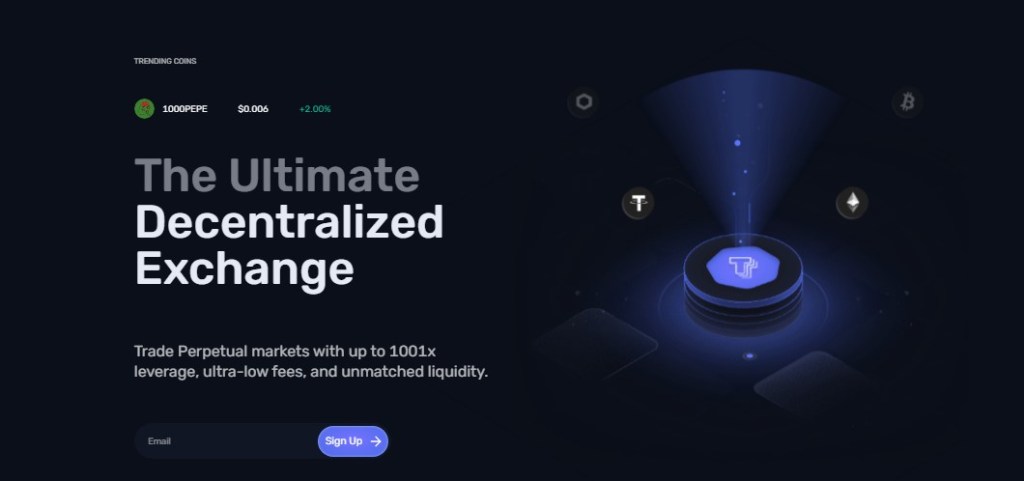 Since on-chain trading can be chaotic during high volatility, having a platform that simplifies execution is valuable. This is especially true for meme coin cycles, where timing matters and users do not want to waste time opening multiple apps just to complete a trade.
Since on-chain trading can be chaotic during high volatility, having a platform that simplifies execution is valuable. This is especially true for meme coin cycles, where timing matters and users do not want to waste time opening multiple apps just to complete a trade.
Overall, The True Trade fits users who prioritize a fast DeFi workflow, but still want the transparency and settlement benefits of blockchain-based execution.
5. Changelly – Instant Crypto Swap Platform with Broad Asset Coverage
Changelly is a popular choice for quick conversions because it supports a wide range of coins and provides a simple swap flow. Instead of acting like a classic DEX with liquidity pools and complex routing dashboards, Changelly positions itself as an instant exchange solution for users who want speed and convenience.
Where Changelly shines is accessibility. It supports fast swaps between many assets, and it is often used by people who hold crypto on one chain but want exposure to another coin without using a full exchange interface. This is especially useful for casual traders and newcomers who want to avoid the steep learning curve of DeFi platforms.
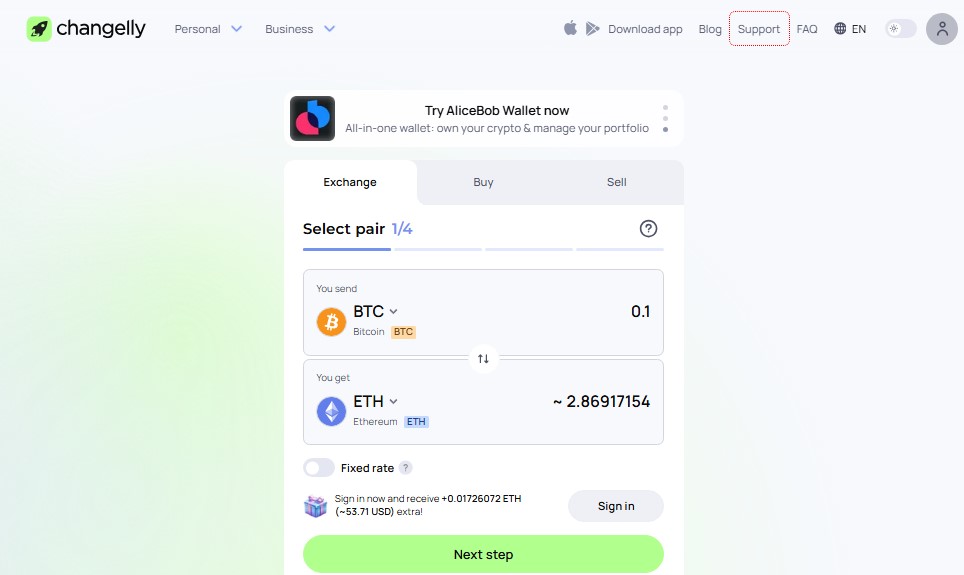 Unlike pure DEX platforms, Changelly leans more into the “swap service” model. Execution is built around convenience rather than full DeFi control, meaning it is not the ideal pick for users who want deep customization or direct liquidity pool interaction.
Unlike pure DEX platforms, Changelly leans more into the “swap service” model. Execution is built around convenience rather than full DeFi control, meaning it is not the ideal pick for users who want deep customization or direct liquidity pool interaction.
Still, as an entry point for quick token conversions, Changelly remains one of the most beginner-friendly platforms in the space.
How to Pick The Best Decentralized Exchange
Choosing a decentralized exchange is no mean feat. You should consider the following factors when deciding between DEXs:
- Trading fees: These vary significantly depending on the DEX. For instance, MEXC has a 1% trading fee, while Meteora only has gas fees.
- Coin diversity: Especially new tokens. OKX, for instance, supports thousands of tokens across 130+ chains, while Meteora only SPL tokens.
- Accessibility: How easily can you swap tokens, join a liquidity pool, adjust the slippage, and start trading?
- Liquidity: DEXs with less liquidity mean trades may take longer, and slippage can spike, leading to significant price variations and potential losses.
- Reputation: Community sentiment gives a good idea about a DEX’s utility, ease of use, and safety.
- Liquidity pool APR: The higher the APR, the higher your passive income and, hence, profits. The wider the range of APR offerings, the more flexible a DEX is.
- Security: Research any previous breaches, allegations of unauthorized access, and security vulnerabilities.
Aside from being important to-dos when looking for DEXs, these elements are also key elements of our research methodology.
We double-check external security audits and its social media presence. We also trade on the platform to see how it performs in day-to-day activities.
The Best Decentralized Exchange Platforms Compared
We compared all the DEXs below to help you make a quick and informed decision without much hassle.
| Platform | Trading Fees | Chains Supported | Best For |
|---|---|---|---|
| Best Wallet | Varies by route (DEX aggregator) | Multichain | Non-custodial swaps, all-in-one DeFi access |
| MEXC DEX+ | 1% per swap | Multichain | Simplified DEX trading, route scanning |
| OKX | 0% to 0.85% per swap | 130+ | Beginners, smart routing and tracking tools |
| The True Trade | Varies by swap, network fees apply | Multichain (varies) | Fast execution, clean on-chain trading workflow |
| Changelly | Varies by swap | Multichain | Quick conversions, broad coin support |
On a use-case basis, OKX seems to be the best option, as it offers the most flexibility – the most coins supported, the most user-friendly interface, and decent liquidity.
But the other five aren’t out of the race either. Meteora and Bybit’s Byreal have zero protocol fees, while MEXC is a CEX/DEX hybrid that offers the best of both worlds.
As always, DYOR and make the best decision for your use case!
Getting Started With a Decentralized Crypto Exchange
To help you understand how DEXs work, we’ll show you the ropes step-by-step on OKX, one of the best decentralized exchanges.
Step 1: Create a Crypto Wallet
To access OKX DEX, you only need a crypto wallet, such as Best Wallet or the OKX Wallet. You don’t have to register an account or pass KYC like you would with the OKX CEX.
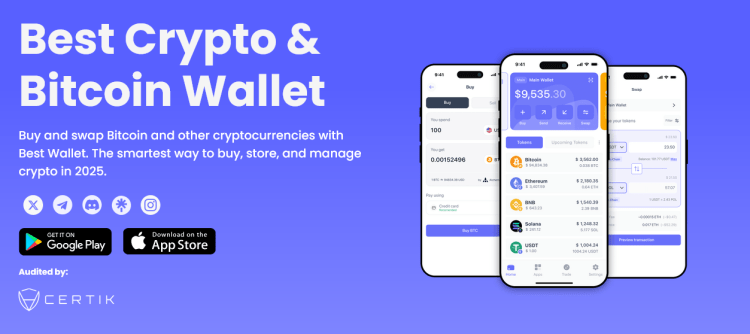 To download Best Wallet app, visit its official website using the link we provided above and click on ‘Get it on Google Play’ or ‘Download on the Apple Store,’ depending on your device. Then, get the mobile app and register with your email; no KYC or seed phrases are required.
To download Best Wallet app, visit its official website using the link we provided above and click on ‘Get it on Google Play’ or ‘Download on the Apple Store,’ depending on your device. Then, get the mobile app and register with your email; no KYC or seed phrases are required.
Step 2: Access OKX DEX
You can access OKX’s decentralized platform through several methods. One way is to go to OKX’s main website, then click on ‘More’ -> ‘Web3’ in the header. This will transfer you to OKX Wallet website, where you need to click on ‘Swap’ in the header.
 Step 3: Connect Your Wallet to the DEX
Step 3: Connect Your Wallet to the DEX
Click on ‘Connect Wallet’ and pick your wallet (for wallets other than OKX, switch to the ‘Other’ tab). Scan the QR code on your screen with your wallet’s mobile app.
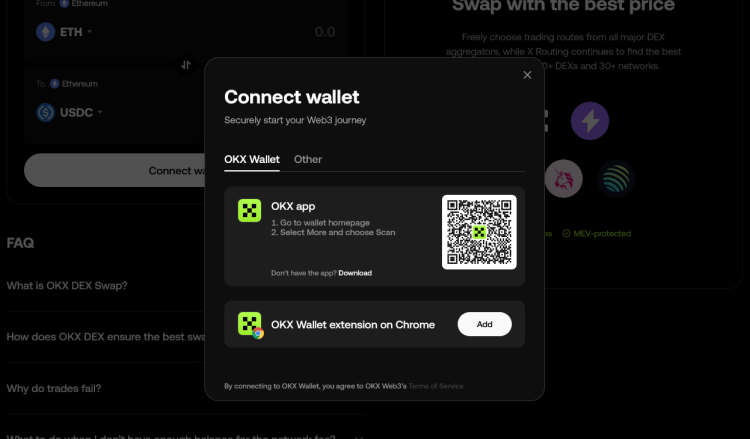 Step 4: Start Swapping
Step 4: Start Swapping
With your wallet connected, you can start swapping tokens. Select the token you want to trade in the first box and the one you want to trade for in the second box. Then, click ‘Swap’ at the bottom.
Conclusion – The Best Decentralized Exchanges
The DEX industry has climbed to unthinkable heights, reaching a $3.6T market cap. DeFi has a 7.4% market dominance, and over 250M people use DEXs monthly.
Decentralized exchanges have an understandable appeal:
- Complete self-custody for user funds
- Fewer limitations and restrictions, offering more trading opportunities
- A decentralized ecosystem where liquidity pools incentivize ecosystem participation
- Permissionless trading with no one to freeze funds or control the flow of money
- Excellent anonymity and privacy thanks to the no-KYC ecosystem
Some of these elements have a double edge, to be sure (like permissionless trading allowing illicit activities when taken to an extreme), but the pros more than make up for them.
The DEXs on our list are individually suited for particular traders and use cases. Remember that you should DYOR and independently decide if an exchange is well-suited for your trading goals. Make informed decisions so you don’t regret them later!
FAQs
1. What’s the difference between decentralized and centralized exchanges?
The main difference between decentralized and centralized exchanges is the shift in asset control. CEXs control your assets and private keys, while DEXs do not.
Other differences include liquidity (DEXs tend to be less liquid), token selection (DEXs tend to have newer, more volatile coins), and fees (DEXs tend to be cheaper).
3. What is the best DEX for beginners?
The best DEX for beginners is OKX. Swapping is intuitive; with the Easy mode, swaps take just a few clicks. At the same time, there are plenty of advanced features to explore once you’re ready. It’s one of the best beginner experiences in the DEX industry.
4. Are decentralized crypto exchanges safe?
Yes, decentralized exchanges are safe, meaning it’s highly unlikely you’ll be hacked. Plus, you control your private keys, so even if the exchange gets hacked, your funds will likely be fine.
However, DEXs tend to list newer coins (like meme coins fresh out of presale) that might have bouts of extreme volatility, and you might get burnt if you don’t DYOR properly.



